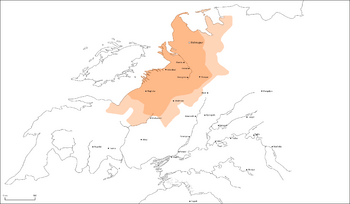Naratha Confederacy: Difference between revisions
No edit summary |
No edit summary |
||
| Line 13: | Line 13: | ||
|date_start = <!-- Optional: Date of establishment, in format 1 January (no year) --> | |date_start = <!-- Optional: Date of establishment, in format 1 January (no year) --> | ||
|year_start = 1635 | |year_start = 1635 | ||
|event_end = | |event_end = Collapse | ||
|date_end = <!-- Optional: Date of disestablishment, in format 1 January (no year) --> | |date_end = <!-- Optional: Date of disestablishment, in format 1 January (no year) --> | ||
|year_end = 1847 | |year_end = 1847 | ||
| Line 24: | Line 24: | ||
|event3 = Great Betrayal | |event3 = Great Betrayal | ||
|date_event3 = xxxx | |date_event3 = xxxx | ||
|event4 = | |event4 = [[Euclea|Euclean]] Invasions | ||
|date_event4 = | |date_event4 = 1840 | ||
|event5 = | |event5 = | ||
|date_event5 = | |date_event5 = | ||
| Line 87: | Line 87: | ||
|year_leader3 = | |year_leader3 = | ||
|year_leader4 = | |year_leader4 = | ||
|title_leader = | |title_leader = Senpati | ||
|representative1 = <!-- Name of representative of head of state (e.g. colonial governor) --> | |representative1 = <!-- Name of representative of head of state (e.g. colonial governor) --> | ||
|representative2 = | |representative2 = | ||
| Line 135: | Line 135: | ||
The '''Naratha Confederacy''' ({{wp|hindi language|Matrabashi}}: Naratha Sangharsh) was a multi-ethnic complex of {{wp|polities}} in north-western [[Satria]] that developed during the Togoti Era and continued until its collapse in 1847. From its establishment in 1635 to its collapse, the Confederacy was dominated by three blocks – [[Sanyukt]], [[Rathankot]], [[Zulmat]] and [[Harringhata|the Lowlands]] – with the Sanyukti and Rathani blocks dominating the politics and leadership of the Confederacy. The core of the confederacy remained intact throughout its existence but its peripheral borders would change considerably throughout the lifespan of the Naratha Confederacy. The external borders of the Confederacy did not change considerably from the Treaty of Bishnupur – which saw the departure of the Lowlands, consolidation of power in the newly created position of Chhtrapati, and centralisation of the confederate government in the new confederate capital of Bishnupur – to the dissolution of the Confederacy. | The '''Naratha Confederacy''' ({{wp|hindi language|Matrabashi}}: Naratha Sangharsh) was a multi-ethnic complex of {{wp|polities}} in north-western [[Satria]] that developed during the Togoti Era and continued until its collapse in 1847. From its establishment in 1635 to its collapse, the Confederacy was dominated by three blocks – [[Sanyukt]], [[Rathankot]], [[Zulmat]] and [[Harringhata|the Lowlands]] – with the Sanyukti and Rathani blocks dominating the politics and leadership of the Confederacy. The core of the confederacy remained intact throughout its existence but its peripheral borders would change considerably throughout the lifespan of the Naratha Confederacy. The external borders of the Confederacy did not change considerably from the Treaty of Bishnupur – which saw the departure of the Lowlands, consolidation of power in the newly created position of Chhtrapati, and centralisation of the confederate government in the new confederate capital of Bishnupur – to the dissolution of the Confederacy. | ||
The Naratha Confederacy was a loose coalition of independent nations that had come together in 1635 in response to the rising threat posed by [[Togoti Khaganate]] expansion under Khagan Gurkhan. The confederacy’s largest powers, Sanyukt, Rathankot and Zulmat, took charge of military affairs due to their experience, leadership and efficiency. Over the next few decades, Sanyukt would emerge as the dominant power with its leader constantly being chosen by the nations to be the {{wp|Senapati}} (trans. commander in chief). In response to growing delays and issues regarding military procurement, conscription and funding, the Senpati would begin to take over more and more duties that would have been left to the member states. This growing influence would sow discontent amongst the leadership of the member states but the resulting victories in the war would earn the Senpati favour amongst the common folk. When the Togoti Khaganate collapsed in 1665, the Senpati was exercising control over military, diplomatic, financial and bureaucratic affairs, with the latter enabling them to further reduce the powers of the member state governments. The Senpati would utilise the vast network of [[tulyata|tulyatan]] monastaries as a bureaucratic network that would help them ensure control over local populations. Upon the conclusion of the Confederate-Khaganate war, the Senpati was self-proclaimed as the {{wp|Chhatrapati}} in the Treaty of Bishnupur and the Confederacy began its transition towards a federation with a centralisation of power in the new Chhatrapati. | |||
The first Chhatrapati, XX, was not only a skilled warrior and military strategist, but was also a master politician who had mastered the bureaucratic system, developed personal relationships with most of the member state leaders and had ensured a propaganda effort never before seen to promote his rule. His skills allowed him to rule the Confederacy as an almost unitary state, developing a single currency, reintroducing the bureaucratic systems that had existing during the dynastic and ganga sangh periods, which utilised the tulyatan monastaries, and diversified the government by appointing not only Sanyukti nobles but nobles from across the confederacy. | |||
After the death of XX in 1689, his son and successor, YY, was able to maintain much of what his father had accomplished and over his 32-year reign he would continue the work of trying to transform the still autonomous member states into a single state. Near the end of his reign, however, many of the leaders of the member states that had been around during the age of XX had now died and their successors were not as tied to the confederate regime. The collapse of a common enemy had taken away a unifying enemy for the member states. A lack of personal relations, growing resentment amongst the nobility over the role of the Sanyukti Chhatrapati and distrust over military reforms (which sought to further unify the military) resulted in the sowing of discontent and secession. | |||
By 1775, despite significant economic improvements, the leaders of the member states had had enough of Sanyukti rule and many began to refuse paying their taxes to the Sanyukti Chhatrapati. In 1774, the Sultanate of Zulmat refused taxation payments to the Confederate Government and withdrew from the military alliance. Its irfanic leaders had grown increasingly infuriated by the tulyatan-dominated leadership of the confederacy and the priestly bureaucracy that was now threatening irfanic rule over the still tulyatan-majority Zulmat sultanate. Zulmat still remained a member of the confederacy but its attempts at secession had weakend its security and in 1776 the [[Zemani Empire]] launched and successfully invaded the Zulmat Sultanate. Following this, the Empire and Confederacy would enter into a period of war and peace which would last until the [[Euclea|Euclean]] invasion. The threat of a new enemy in the form of the Zemani Empire helped reunite the Confederacy. | |||
Under the weak leadership of ZZ, a new separatist crisis emerged and continued to grow throughout the early 19th Century. In an attempt to preserve the confederacy which had helped Rathankot prosper economically, it’s King orchestrated a palace coup against Chhatrapati ZZ. The bloody coup saw the execution of dozens of high-ranking military officers, both Sanyukti and Rathani, as well as civil servants, by the Rathankot king’s men as many, despite being rathani, remained loyal to the Chhatrapati. The King installed himself as the new Chhatrapati and in a bid to ensure his control over Sanyukt, ordered the arrest and execution of the Sanyukti royal family to produce a power vaccum in which he would stand alone. The plan backfired when news reached the Sanyukti family, and they fled from the confederate capital of Bishnupur to their ancient capital of [[Kinadica]]. Within a few weeks, the confederacy erupted into civil war. The civil war would significantly weaken the once great confederacy, allowing the [[Etruria|Etrurian]] and [[Gaullica|Gaullican]] colonial empires easy picking when they landed their invasion forces in the mid-19th century. | |||
{{Rajyaghar}} | {{Rajyaghar}} | ||
Revision as of 15:32, 12 April 2021
This article is incomplete because it is pending further input from participants, or it is a work-in-progress by one author. Please comment on this article's talk page to share your input, comments and questions. Note: To contribute to this article, you may need to seek help from the author(s) of this page. |
Naratha Confederacy | |||||||||||||||||||||||||
|---|---|---|---|---|---|---|---|---|---|---|---|---|---|---|---|---|---|---|---|---|---|---|---|---|---|
| 1635–1847 | |||||||||||||||||||||||||
|
Military Banner (1635-1776) Confederate Flag (1776-1847) | |||||||||||||||||||||||||
 The Naratha Confederacy in 1784 | |||||||||||||||||||||||||
 The change of territory of the Naratha Confederacy | |||||||||||||||||||||||||
| Status | Confederation | ||||||||||||||||||||||||
| Capital | Bishnupur (from 1776) | ||||||||||||||||||||||||
| Common languages | Matrabashi | ||||||||||||||||||||||||
| Government | Confederal, elective monarchy | ||||||||||||||||||||||||
| Senpati | |||||||||||||||||||||||||
| Chhatrapati | |||||||||||||||||||||||||
| Legislature | Sanghasabha | ||||||||||||||||||||||||
| Historical era | Togoti Era | ||||||||||||||||||||||||
• Vichalan Accords | 1635 | ||||||||||||||||||||||||
• Treaty of Bishnupur | 1776 | ||||||||||||||||||||||||
• Southern Conquest | 1784 | ||||||||||||||||||||||||
• Great Betrayal | xxxx | ||||||||||||||||||||||||
• Euclean Invasions | 1840 | ||||||||||||||||||||||||
• Collapse | 1847 | ||||||||||||||||||||||||
| Currency | Multiple | ||||||||||||||||||||||||
| |||||||||||||||||||||||||
| Today part of | |||||||||||||||||||||||||
The Naratha Confederacy (Matrabashi: Naratha Sangharsh) was a multi-ethnic complex of polities in north-western Satria that developed during the Togoti Era and continued until its collapse in 1847. From its establishment in 1635 to its collapse, the Confederacy was dominated by three blocks – Sanyukt, Rathankot, Zulmat and the Lowlands – with the Sanyukti and Rathani blocks dominating the politics and leadership of the Confederacy. The core of the confederacy remained intact throughout its existence but its peripheral borders would change considerably throughout the lifespan of the Naratha Confederacy. The external borders of the Confederacy did not change considerably from the Treaty of Bishnupur – which saw the departure of the Lowlands, consolidation of power in the newly created position of Chhtrapati, and centralisation of the confederate government in the new confederate capital of Bishnupur – to the dissolution of the Confederacy.
The Naratha Confederacy was a loose coalition of independent nations that had come together in 1635 in response to the rising threat posed by Togoti Khaganate expansion under Khagan Gurkhan. The confederacy’s largest powers, Sanyukt, Rathankot and Zulmat, took charge of military affairs due to their experience, leadership and efficiency. Over the next few decades, Sanyukt would emerge as the dominant power with its leader constantly being chosen by the nations to be the Senapati (trans. commander in chief). In response to growing delays and issues regarding military procurement, conscription and funding, the Senpati would begin to take over more and more duties that would have been left to the member states. This growing influence would sow discontent amongst the leadership of the member states but the resulting victories in the war would earn the Senpati favour amongst the common folk. When the Togoti Khaganate collapsed in 1665, the Senpati was exercising control over military, diplomatic, financial and bureaucratic affairs, with the latter enabling them to further reduce the powers of the member state governments. The Senpati would utilise the vast network of tulyatan monastaries as a bureaucratic network that would help them ensure control over local populations. Upon the conclusion of the Confederate-Khaganate war, the Senpati was self-proclaimed as the Chhatrapati in the Treaty of Bishnupur and the Confederacy began its transition towards a federation with a centralisation of power in the new Chhatrapati.
The first Chhatrapati, XX, was not only a skilled warrior and military strategist, but was also a master politician who had mastered the bureaucratic system, developed personal relationships with most of the member state leaders and had ensured a propaganda effort never before seen to promote his rule. His skills allowed him to rule the Confederacy as an almost unitary state, developing a single currency, reintroducing the bureaucratic systems that had existing during the dynastic and ganga sangh periods, which utilised the tulyatan monastaries, and diversified the government by appointing not only Sanyukti nobles but nobles from across the confederacy.
After the death of XX in 1689, his son and successor, YY, was able to maintain much of what his father had accomplished and over his 32-year reign he would continue the work of trying to transform the still autonomous member states into a single state. Near the end of his reign, however, many of the leaders of the member states that had been around during the age of XX had now died and their successors were not as tied to the confederate regime. The collapse of a common enemy had taken away a unifying enemy for the member states. A lack of personal relations, growing resentment amongst the nobility over the role of the Sanyukti Chhatrapati and distrust over military reforms (which sought to further unify the military) resulted in the sowing of discontent and secession.
By 1775, despite significant economic improvements, the leaders of the member states had had enough of Sanyukti rule and many began to refuse paying their taxes to the Sanyukti Chhatrapati. In 1774, the Sultanate of Zulmat refused taxation payments to the Confederate Government and withdrew from the military alliance. Its irfanic leaders had grown increasingly infuriated by the tulyatan-dominated leadership of the confederacy and the priestly bureaucracy that was now threatening irfanic rule over the still tulyatan-majority Zulmat sultanate. Zulmat still remained a member of the confederacy but its attempts at secession had weakend its security and in 1776 the Zemani Empire launched and successfully invaded the Zulmat Sultanate. Following this, the Empire and Confederacy would enter into a period of war and peace which would last until the Euclean invasion. The threat of a new enemy in the form of the Zemani Empire helped reunite the Confederacy.
Under the weak leadership of ZZ, a new separatist crisis emerged and continued to grow throughout the early 19th Century. In an attempt to preserve the confederacy which had helped Rathankot prosper economically, it’s King orchestrated a palace coup against Chhatrapati ZZ. The bloody coup saw the execution of dozens of high-ranking military officers, both Sanyukti and Rathani, as well as civil servants, by the Rathankot king’s men as many, despite being rathani, remained loyal to the Chhatrapati. The King installed himself as the new Chhatrapati and in a bid to ensure his control over Sanyukt, ordered the arrest and execution of the Sanyukti royal family to produce a power vaccum in which he would stand alone. The plan backfired when news reached the Sanyukti family, and they fled from the confederate capital of Bishnupur to their ancient capital of Kinadica. Within a few weeks, the confederacy erupted into civil war. The civil war would significantly weaken the once great confederacy, allowing the Etrurian and Gaullican colonial empires easy picking when they landed their invasion forces in the mid-19th century.

